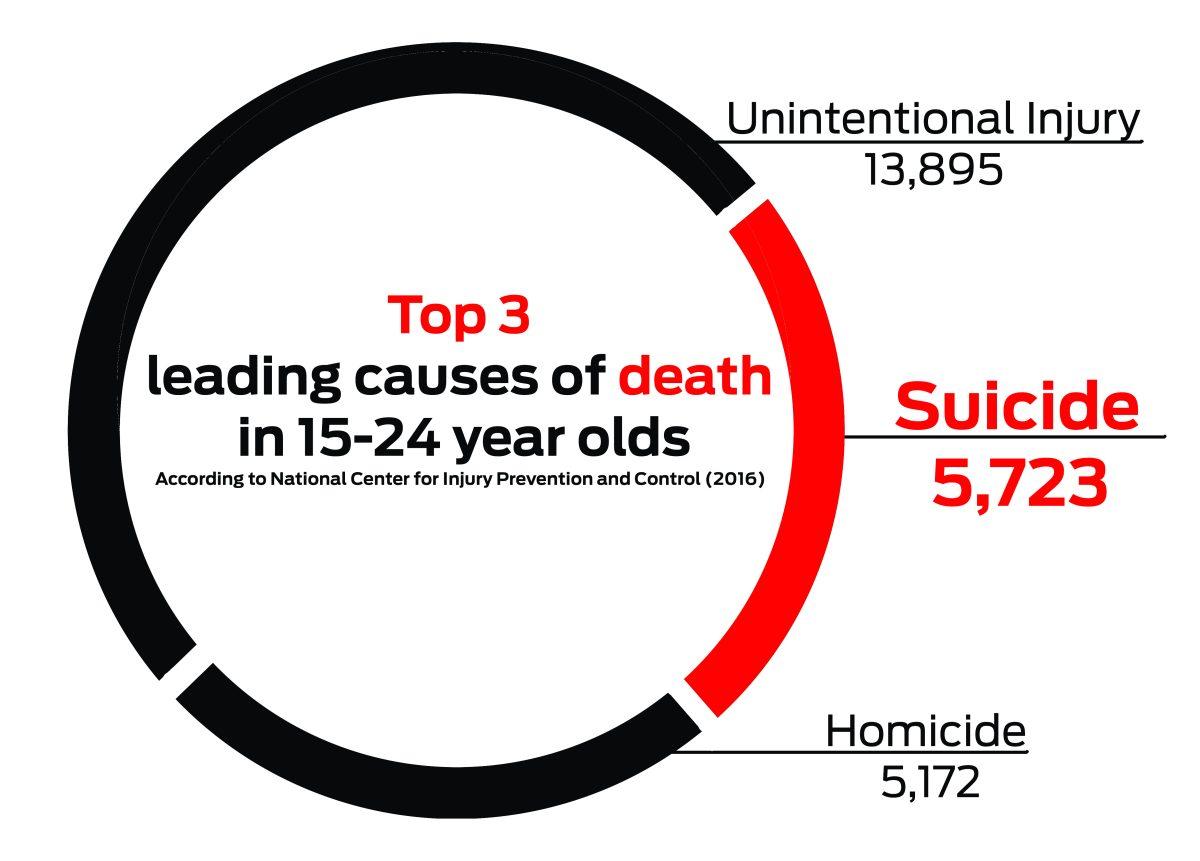National Suicide Prevention Week, Sept. 9 to 15, is part of a nationwide effort to encourage communication and fight the stigma surrounding suicide.
The week falls in the middle of National Suicide Prevention Awareness Month and includes various programs and educational initiatives. In the United States, suicide is the second leading cause of death for people ages 10 to 34 and the 10th leading cause of death overall, according to data from the CDC published by the National Institute of Mental Health and the American Foundation for Suicide Prevention. According to the same data from 2016, men died by suicide 3.53 times more often than women and suicide rates were highest among Native Americans and Alaskan Natives.
Santana Simple, professional counselor and director of suicide prevention at Student Counseling Services, said her job includes training students, faculty and staff to identify and offer help to those who may be contemplating suicide.
“What I talk a lot about in the trainings is that the stigma of ‘Oh, I can’t talk about suicide’ or ‘If I bring it up then I’m going to give that person the idea,’” Simple said. “I think it just represents our anxiety about talking about suicide but really what we have to switch our frame of reference is recognizing that communication of checking in on someone is lifesaving.”
Learning how to take action and break the stigma around suicide is essential, Simple said and students should be aware of what they can do to make a difference.
“National Suicide Awareness Month and week is really just about us erasing that stigma and making sure that we are recognizing that someone is struggling,” Simple said. “Checking in on them, getting them connected to resources.”
Simple said the Suicide Awareness Walk, an on-campus event hosted by Student Counseling Services on Sept. 19 from 7 p.m. to 9 p.m. in Rudder Plaza, will be an opportunity for students to learn how to help.
If someone has a sense that something may be wrong with another person that could lead to suicide, Simple said the first thing to do is start a conversation.
“If you have that inclination that something is wrong and this person is not quite being themselves I think the first thing students should know is to check in on that person, even if it’s just asking what’s going on,” Simple said.
For more immediate assistance, the student counseling HelpLine is always open for students to use. HelpLine coordinator Susan Vavra, said the phone service is a valuable resource for students experiencing suicidal thoughts.
“When it comes to suicide specifically, we certainly invite anyone who is having any kind of suicidal ideation or thinking about making an attempt to give us a call and talk to us about what that’s feeling like to them,” Vavra said. “We’re hoping that we can de-escalate that to where they’re in a place after making that human contact with somebody and talking it through to where those feelings aren’t as strong as they were prior to picking up the phone and making a connection with us.”
As technology has become a greater part of communication, Vavra said she recommends talking with someone about the various Student Counseling Services options.
“We’re a counseling agency, so obviously we’re strong advocates for people actually verbally talking out what’s going on with them as much as they can,” Vavra said. “Whether that translates to either somebody coming in for services and sitting with a therapist or being in a group or a workshop or calling the HelpLine and actually talking that out verbally.”
Suicide is 100 percent preventable according to Alicia Steinley, health senior and President of Active Minds, an organization that aims to increase student’s awareness of mental health issues and provide resource.
“Suicide prevention is very important to me because I lost my dad to suicide when I was 15, so ever since then I’ve been focusing on trying to better the lives of people around me and focusing on suicide prevention in my own community,” Steinley said.
Active Minds members complete suicide prevention training through the Student Counseling Services and are helping host the Suicide Awareness Walk, according to Steinley. Additionally, the organization facilitates the “1,100 Flags” event in which Academic Plaza is covered in pink flags, each representing a college student who has committed suicide in the past year.
“We want to make it known how big of a deal it is because I don’t think that a lot of people know and they brush it off, but rates for college students are really high,” Steinley said.
If you or someone you know needs to access resources for suicide prevention, call the A&M Student Counseling Services HelpLine at 979-845-2700 for free services from 4 p.m. to 8 a.m. weekdays and 24 hours a day on weekends.
Events look to encourage open dialogue on suicide
September 9, 2018
Photo by Graphic by Jesse Everett
According to the National Center for Injury Prevention and Control, over 5,000 15-24-year-olds died by suicide in 2016.
0
Donate to The Battalion
$2790
$5000
Contributed
Our Goal
Your donation will support the student journalists of Texas A&M University - College Station. Your contribution will allow us to purchase equipment and cover our annual website hosting costs, in addition to paying freelance staffers for their work, travel costs for coverage and more!
More to Discover










